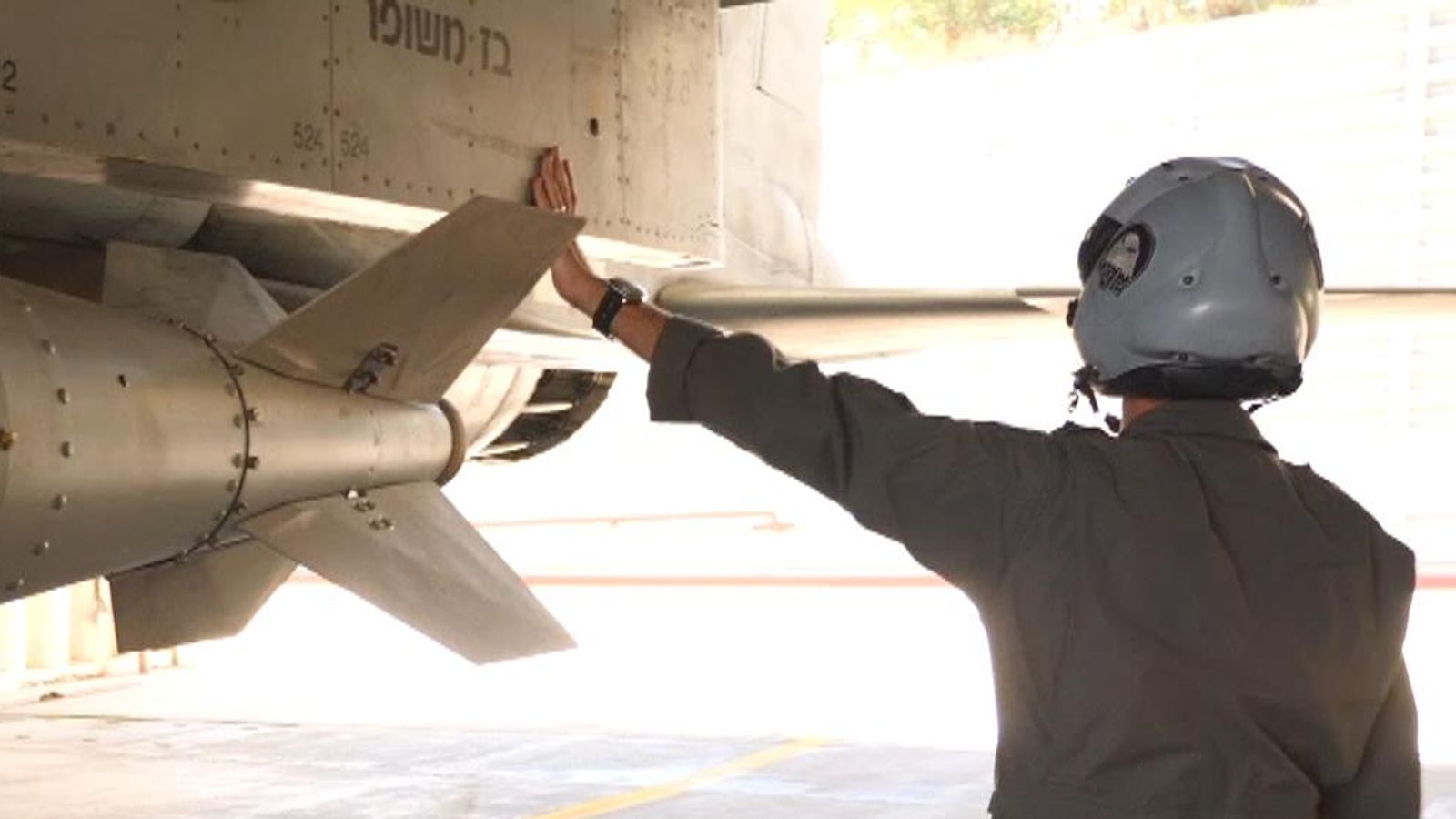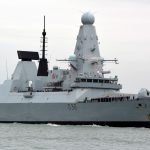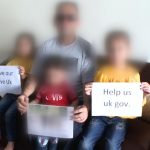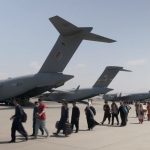An Israeli fighter pilot who operated against Palestinian militants in Gaza this month has said all civilian deaths in the conflict were tragic, but that he only bombed “Hamas-related” targets.
The 29-year-old, who gave his name as Captain B for security reasons, said his job was to “defend my country”.
Asked if he was worried he was involved in a mission that could be equated to war crimes, the officer said: “The Israeli Air Force is here to stop Hamas from sending rockets that are being sent into large populated cities [in Israel] – the civilian, densely populated cities like Tel Aviv, like Jerusalem, like Ashdod and Ashkelon, they are targeting civilians.
“As an Israeli Air Force pilot, I know every target that is carried out by the Israeli Air Force has the entire operation behind it – also in the air and also on the ground – making sure that every target that we target is, 1: Hamas-related, and 2: cleared in order to limit every attack from civilian casualties. That’s our mission.”
Captain B spoke to Sky News at an Israeli air base on the day before Israel agreed to a ceasefire with Gaza’s Hamas rulers last week.
On Thursday of this week, the United Nations top human rights body agreed to launch an investigation into the 11-day conflict – a move Israel has rejected, calling it more evidence of the Human Rights Council’s “anti-Israel obsession”.
Michelle Bachelet, the UN high commissioner for human rights, told the council in Geneva that Israeli airstrikes might constitute war crimes and that Hamas had violated international humanitarian law by firing rockets into Israel.
More than 60 children died on the Palestinian side and two in Israel.
Asked what he would say to the children who have lost parents and siblings because of the operation, Captain B paused for a moment before replying.
“When you ask that question, what I visualise is what’s happening here in Israel… Israeli lives and civilians are being targeted, which is different, but are also dying,” he said.
Please use Chrome browser for a more accessible video player
“At the end of the day, I don’t want to imagine a situation or a reality where people have to lose loved ones simply because they were in the area.”
As for whether he was affected by news reports about the bodies of children being pulled from the rubble, he said: “Every civilian casualty is tragic, whether it’s in Gaza, whether it’s in Israel. I am here to defend the Israeli civilians.”
The officer, a married father-of-one, joined the military 11 years ago.
He became an operational fighter pilot in 2015 and flies F15 jets armed with precision-guided J-DAM bombs.
The officer left full-time military service last year to return to his studies, but he remains a reservist and was called back to his base as tensions mounted between Israel and Hamas, as well as another Palestinian group called Islamic Jihad.
He said he flew sorties from the first night of hostilities on 10 May.
“Not everyone has the opportunity to fly a fighter jet, but I don’t fly the fighter jet for fun,” he said. “This is part of what I want to do. I’m here to defend the country. And in every mission, that’s exactly how I feel.”
He said the air force halts or aborts attacks if they identify civilians on the ground.
Follow the Daily podcast on Apple Podcasts, Google Podcasts, Spotify, Spreaker
A spokesperson for the Israel Defence Forces (IDF) said she did not yet know how many times missions were scrapped or paused during the campaign – which saw the Israeli military hit more than 1,500 targets in Gaza – but she said “there were many”.
Captain B, asked if he was concerned civilians might have been killed in the bombs he dropped, said: “I know that every mission that I carried out was Hamas-related in order to stop Hamas from firing the rockets into Israel.”
A professor of international law, however, said that just because a target is linked to Hamas might not be enough for it to be classed as a legitimate target and even when a target is legitimate, the force used to attack it must be proportionate.
“What is difficult to understand and for some people also to accept is that the proportionality is not between the number of victims on both sides, but – for each attack – between the military advantage and the expected harm amongst the civilian population,” Marco Sassoli, professor of international law at the University of Geneva, told Sky News.
The academic said that the attacking side must also take “feasible precautionary measures to reduce the number of civilian victims”.
Captain B said he was confident in the system that authorises him to open fire.
“We have mathematicians and physicists that look at the exact detail of every bomb in order to precisely place these bombs – if it’s tunnels, then underneath the ground and if it’s a warehouse, then at the right place – in order to minimise civilian casualties…
“So, I feel responsible [when pressing the button to launch a bomb], but… as long as it occurred as planned, I have 100% trust in the system that everything will work.”
But a former Israeli sniper who now belongs to a group of veterans that is critical of Israel’s military offensives said that he did not think the military actions in Gaza were right.
As well as the civilian death toll, Nadav Weiman, deputy director of Breaking the Silence, said each time there is a conflict, infrastructure – like roads and power lines – is also damaged.
“We have the right to defend ourselves, right? We have a right to have an army – look at the neighbourhood where we’re living – of course we need an army,” he said.
“But the question that we do ask ourselves is: [is what I am] doing in the Gaza Strip or, by the way, the West Bank … defending Israel? And I think the answer is no.
“Gaza doesn’t have a military solution. It is supposed to be a solution that comes from our politicians right now. Because we’re firing more and more munitions to Gaza, we’re killing more and more Palestinians and civilians…
“Of course I am uncomfortable with that. We don’t have any other option but talking with Palestinians and finding other solutions than firing more and more rockets.”
For Captain B, he said targets for the air force, which is part of the Israel Defence Forces (IDF), included Hamas rockets, rocket launchers and a network of underground tunnels.
“What’s important to understand is that Hamas creates all this infrastructure within their civilian communities,” he said.
“They are using their civilian assets as human shields…. So, in retrospect, Hamas is the one to blame in regards to any civilian casualties on their end.”
This is an allegation Hamas has denied.
Please use Chrome browser for a more accessible video player
The International Criminal Court in the Hague launched an investigation earlier this year into actions by both sides dating from the build up to a previous Gaza conflict in 2014.
The outgoing chief prosecutor has warned that individuals involved in the latest eruption of violence may also be targeted by the inquiry.






















